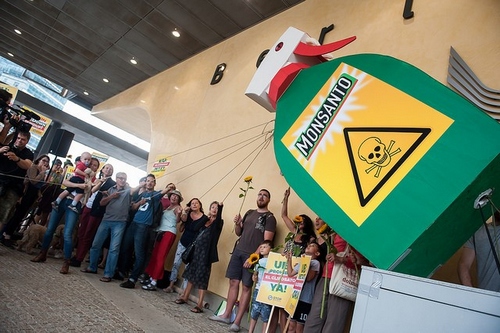Giant weedkiller bottle torn down as Europe debates future of glyphosate
1.3 Million Europeans call for ban in fastest growing citizens initiative
Citizens toppled a giant glyphosate bottle at the Schuman roundabout outside the European Commission to symbolise the demand of over 1.3 million people across Europe calling for a ban of the controversial weedkiller.

At the same time, EU members states were meeting to discuss the licensing of glyphosate in the European Union. The debate over its future prompted the fastest growing European Citizens’ Initiative in history; it demands an end to its use, an overall reduction in pesticide use, and more transparency in their safety assessments.
David Schwartz, ECI Coordinator at WeMove.EU said: “There is more than enough scientific evidence of glyphosate’s health and environmental harm to justify a ban. Over one million Europeans are asking for a glyphosate ban and a transition to a pesticide-free future. Every day, organic farmers are showing that it is possible to be productive and profitable without pesticides. It is high time our governments listen to their citizens, dismiss industry-peddled information and reject the Commission’s proposal to keep glyphosate on the market for another ten years.”
The European Commission is proposing relicensing glyphosate for ten years, despite the UN’s independent cancer experts, IARC, saying that it is a “probable” cause of cancer. California has recently added glyphosate to its list of chemicals that can cause cancer.
Serious concerns have also been raised about the corporate capture of the glyphosate regulatory process. The inspector general of the US Environmental Protection Agency (EPA) has launched an investigation into potential collusion between a former senior staff member and Monsanto, the world’s biggest glyphosate producer. Additional information suggests that that the same EPA employee played an improper role in the European safety assessment of glyphosate.
The European Food Safety Authority (EFSA) and the European Chemicals Agency (ECHA) have said glyphosate is unlikely to cause cancer, but have pointed to serious environmental damage caused by the chemical. EFSA is also currently assessing evidence that glyphosate disrupts the human hormone system.
Dr Christopher Portier, one of ninety-six independent scientists who publicly stated that the EFSA assessment is not supported by the evidence submitted, also warned that EFSA and ECHA failed to identify numerous tumour findings in the confidential industry-submitted animal studies. EFSA and ECHA responded that the studies “have been adequately considered and therefore [they] see no need for [their] evaluations to be revisited”.
Source: Greenpeace European Unit
- 359 reads
Human Rights
Fostering a More Humane World: The 28th Eurasian Economic Summi

Conscience, Hope, and Action: Keys to Global Peace and Sustainability

Ringing FOWPAL’s Peace Bell for the World:Nobel Peace Prize Laureates’ Visions and Actions

Protecting the World’s Cultural Diversity for a Sustainable Future

Puppet Show I International Friendship Day 2020

